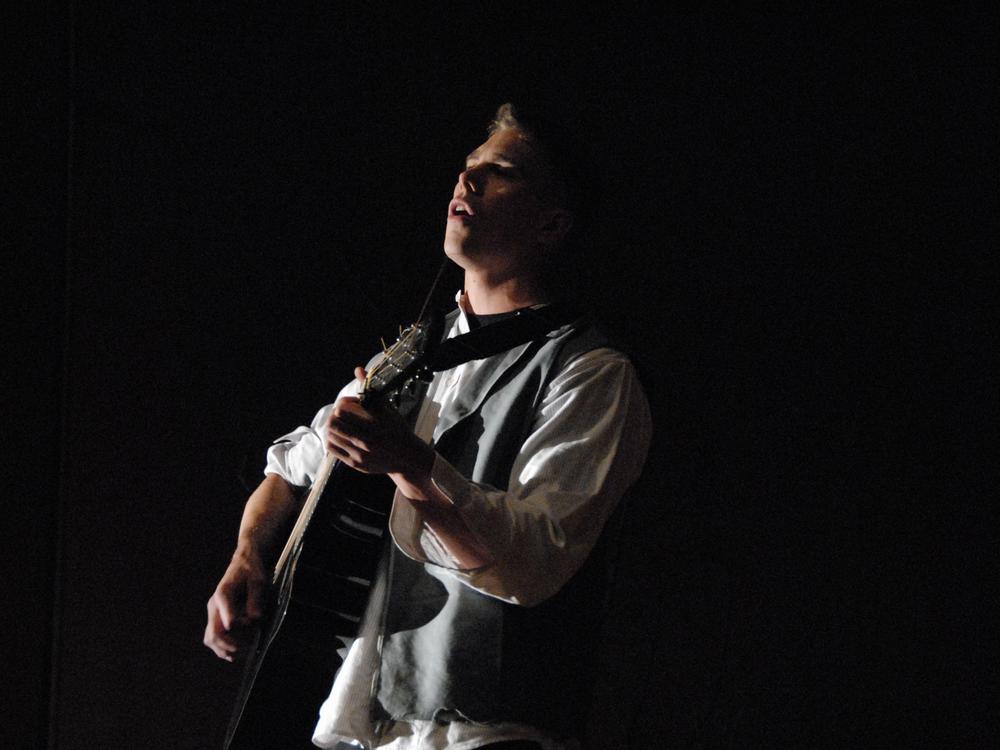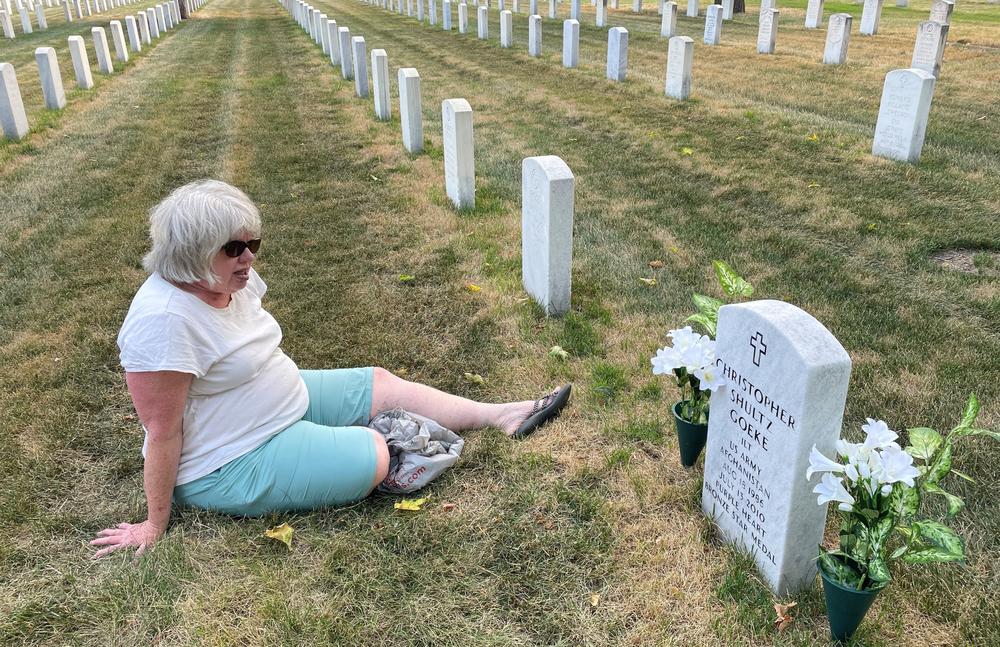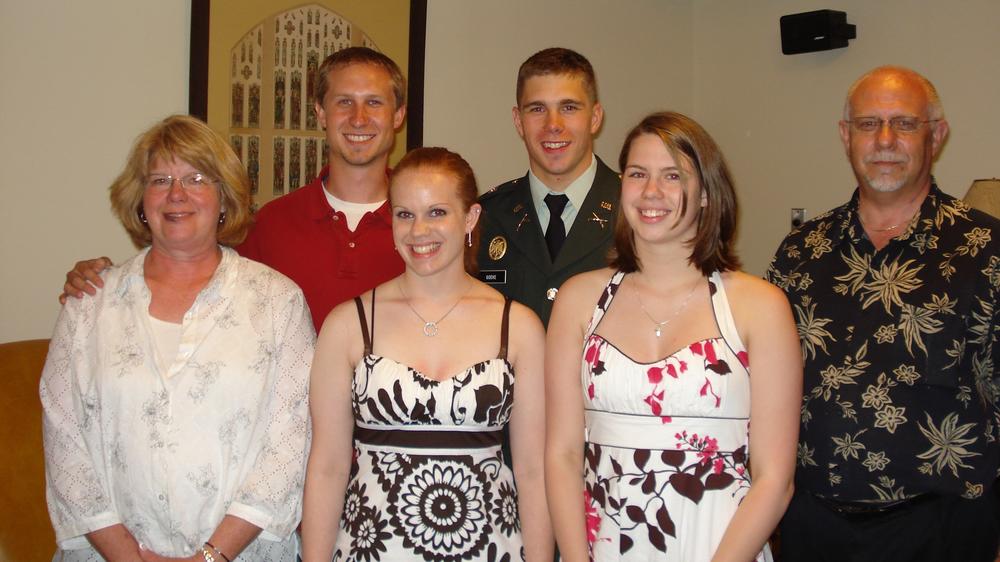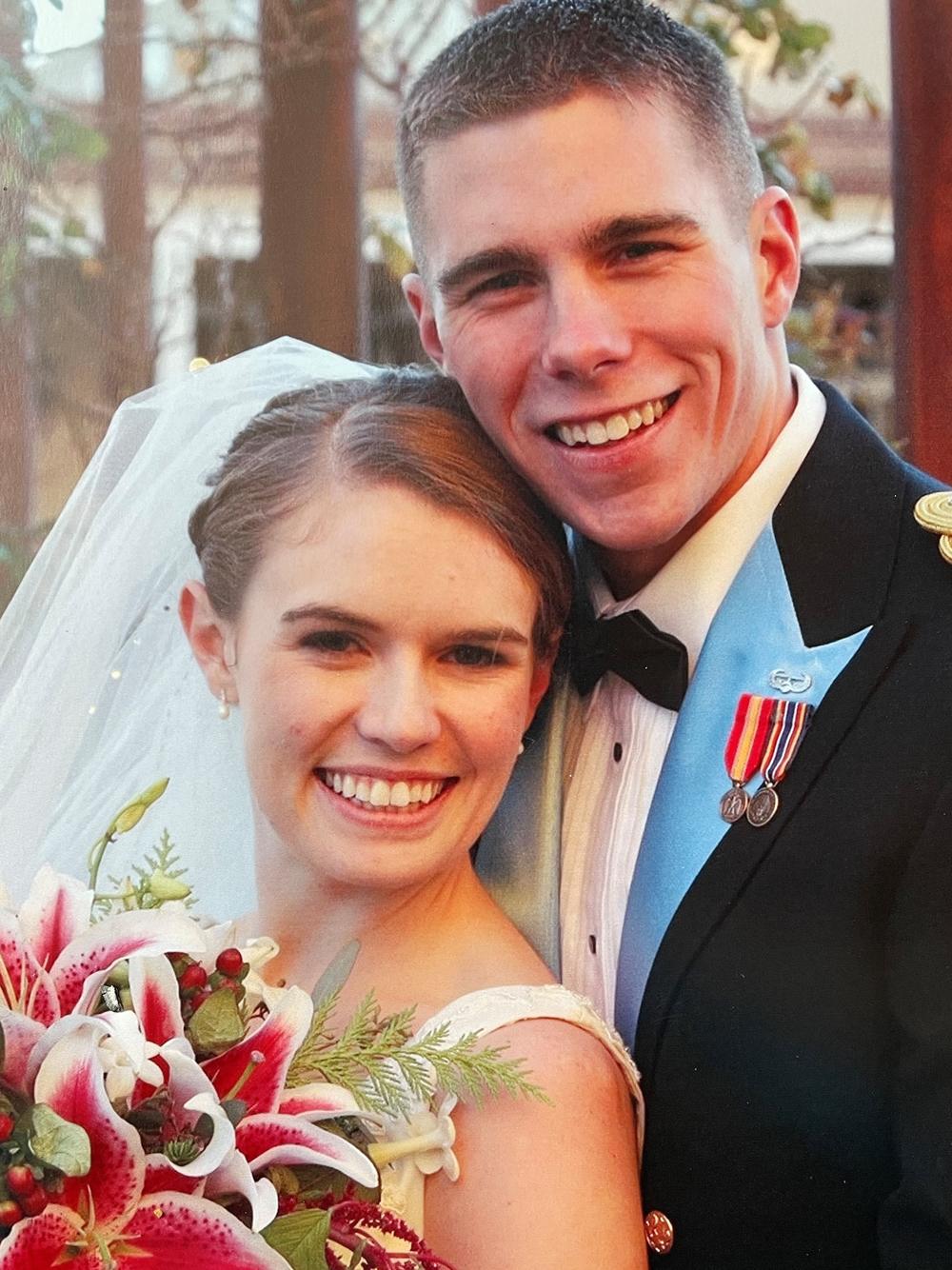Section Branding
Header Content
For A Journalist, The Cost Of War Seen Through A Soldier's Life Cut Short
Primary Content
The one and only time I met Chris Goeke was in 2009 at his tiny forward operating base, a desert fort made of mud and straw in a place called Naw Bahar in the far south of Afghanistan.
I had hitched a ride on a Black Hawk helicopter, traveling with several senior U.S. and Afghan officers. They were on their way to see Goeke's unit, to congratulate them and the Afghan troops they were mentoring on winning a fight against a large, heavily-armed group of Taliban fighters.
We landed in a massive cloud of khaki-colored dust.
The paratroopers referred to Naw Bahar as "FOB Nowhere." It was one of the poorest and most remote corners of one of the poorest and most remote nations on earth, and a long way from serious reinforcements.
Dust devils danced nearby as we walked up, gawking at a destroyed Taliban pickup truck near the gate. There was an anti-aircraft gun on back, and the truck had been cut nearly in half when the Taliban tried to attack.
What I remember, besides the spooky remoteness of the place, was Goeke, the unit's young leader. His words and thinking were so sharp and fresh that when he answered my question about his age, I lowered my notebook and looked at him carefully. The Army lieutenant was just 23 years old. I thought, "I need to keep track of this guy. He's going places."
I figured there would be another story.
Now there is.
At the graveside
Fort Snelling National Cemetery in Minneapolis is a rolling sea of thousands of identical white headstones. But after 11 years of visiting, Dr. Pam Shultz has no problem finding her son's grave.
"It always brings up a lot of emotion," she said, standing over Section D, site 2020. "Sometimes I come out just to sit here. It just kind of depends, you know. I mean, I think when I'm missing him, especially, I like to come out."
As one of her daughters Jessie Goeke, watched, Shultz began trimming a bouquet of silk flowers bought to mark the day, the anniversary of his death.
Silk ones last longer than real flowers. She's had time to learn things like that.
"And sometimes I come out and there's flowers on it. Somebody else has been here," she said. "And a lot of times I don't even know who."
Chris Goeke may have been only 23 when he was killed repelling an insurgent attack on an Afghan Army base. But his influence still ripples through a broad circle of family and friends — friends who still talk about ways he changed them for the better, made them better listeners, better thinkers and just more mindful about how they live.
There is, of course, a story behind every death in war. A sense of what could have been. But with the chaotic end of American longest war, I wanted to get some sense of why Goeke's death haunted me, even though we had talked only for a few minutes all those years ago.
Friends remember his many talents
"When I get these questions about what he was like, they're hard to answer in a lot of ways because everything's sort of inadequate," said Rick Ferrera.
He met Goeke just before their freshman year at Apple Valley Senior High School in suburban Minneapolis.
"Yeah, he was a hard worker, yeah, he was brilliant, yeah, he was a great communicator, yeah, he was hilarious," Ferrara said. "None of that even comes close to, I mean, it was much more than the sum of its parts."
A partial list of things Goeke dug into deeply: Christianity, Buddhism, Hinduism, Islam, literature, gym workouts, leadership, ultimate frisbee, philosophy, math, physics, engineering.
He even got into bonsai trees at one point, said his mother.
There's lots more.
"He was hilarious, and memorized entire episodes of the Simpsons," said West Point classmate Kevin Kniery, now an Army surgeon. "The other thing that's just like, it's just unfair, right? It's like, he was a musical genius. He would come to my parents' house in Connecticut. And you could just ask him to play anything on the guitar. And he could figure it out. Just things that shouldn't be allowed to all be in a single person."
Another friend, Cal Walters, who has a podcast about leadership, pulled together interviews about Goeke as a tribute and lesson in leadership.
Goeke was maybe best known among his friends for escalating even the most casual conversation into a dissection of big ideas, questioning things that seemed built on flimsy logic, even things as mundane as dinner table etiquette.
"No matter what it was, Chris would ask to the core of the debate, or why and how is this?" Kniery said. "Why do we trust this? Why do we believe in this? Why do you do that? Things that I think a lot of us just took as sort of the belief system that we follow to some degree, and he wasn't afraid to talk about anything."
He especially liked to probe existential questions, said Rick Ferrera. Like, what are we here to do? What's a good life? What happens when you die? What should you prioritize while you're alive?
Choosing a path
Goeke's parents, who divorced when he was young, both cite the same incident as formative. For years, he sometimes used his plentiful extra mental horsepower for mischief, and in particular, pranks. Including one on a teacher in 5th grade. The details of the prank itself have faded. But they both remember what the teacher told Goeke.
"She let him know that he was a leader," said Goeke's father, Randy Goeke. "And he could choose his path, how he wanted to lead people. Did he want to lead them down the wrong path or down a good path?"
For whatever reason, his father said, that registered, and there was a sharp change in his son's behavior.
At West Point, Goeke was a literature major and also studied philosophy, acted Shakespeare, taught Sunday school, aced honors courses in physics and calculus, and read voraciously. He read the likes of Carl Jung, Leo Tolstoy, Ernest Hemingway and C.S. Lewis, scribbling notes to himself in the margins as he went.
One of his mentors at West Point was Cynthia Lindenmeyer, then a chaplain.
"The more he learned about something, the more he wanted to know about it," she said. "And I never saw in him any kind of vanity, or that he needed any of this for his identity. It was really all in the spirit of the quest and knowledge for him."
They talked a lot about religion, she said.
"I think he was really searching for a deeper theology than what he had grown up with, and that he was experiencing at West Point. Our last conversations, he was wanting to know more about Buddhism. And also Islam. Of course, going to Afghanistan, he wanted to know a lot more about Muslims and their beliefs."
And he embraced the complexity of what he learned. She recalls a Hindu student telling her Goeke, a Christian of deep faith, had asked a lot of questions about his religion, without any hint of judgment.
"He wasn't stuck in that dualistic mindset where he was right, you were wrong, or that there was good and bad," said Lindenmeyer. "He was really exploring a non-dual world, which, looking back, I think he was just so much more evolved than so many people, to include myself at that time.
"There was a point where I would just look at him and like, Chris, I don't know the answer to that," she said. "I taught you everything I know."
At West Point, Goeke met Kelsey Haggerty, a student at another college who had come to a cadet social event with friends.
They were soon inseparable.
"You know, he was probably the last person to ever write love letters back and forth," Kniery said.
And Goeke began asking deep relationship questions. Maybe too deep.
"He would bring his letters to the mess hall from her, and he would super-analyze them and take notes and be like, 'What do you think she means here?'" Kniery said, laughing. "And I'm like, 'Dude, she's saying she likes you. I don't know, I just don't think there's any secret code there.'"
He graduated 6th in his class and went through the Army's elite Ranger school and officer training.
He and Kelsey were married a few months after graduation and moved to Fort Bragg, North Carolina, not long before his deployment.
She didn't want to be interviewed for this story.
The value of a life
A few months into the deployment, Goeke emailed Kniery, who was in training to be a doctor. Goeke warned one day Kniery would be responsible for lives, too.
"And that is no joke," he wrote in the email. "My battalion has been taking a lot of casualties in these first six months. I think we're at 20 right now. And my CO (commanding officer) was killed a couple of weeks ago. The more doctors the better. I miss you, my friend."
Chris Goeke died July 13, 2010 in an attack on an Afghan police base he was visiting in the southern city of Kandahar.
A bomb hidden in a handcart blew a hole in a wall. Then insurgents wearing suicide vests poured in. Most of the Afghan and American troops inside the base thought it was a mortar or rocket attack and massed inside reinforced bunkers, making them easy targets. Dozens were wounded and killed.
Only Goeke and a small handful of others realized what had happened. They charged straight at the breach, firing, even though they didn't have cover.
His commander then, Scott Haran, now a major who now teaches at West Point, was at his side when an insurgent's vest detonated.
Both went down, Goeke didn't get back up.
"You know, it's super brave and, unfortunately, he died in the attack," Haran said. "But if you think about it, he saved a ton of people's lives with his act."
Friends say Goeke could have become almost anything. A social worker, senator, writer, minister, college professor. Or if he stayed in the Army, a general.
And that he'd have surely made a great dad.
"It wasn't just that he was smarter, stronger than others, but he did the work," said another West Point classmate, John Bockstanz. "And that's something that continues to drive me. I saw him not just being really smart, and intellectual, but he just read like crazy, he's spent so much time investing in learning, invested so much time in listening. And he spent so much time caring for his wife. And that's why he was a good husband. You know, it's not just the fact that he was some superhero, but he was very human. And someone who just had the right priorities and was focused."
But he's gone. As are those other American troops. And more than 1,100 from NATO allies, thousands of contractors, aid workers and journalists. And well over 100,000 Afghan troops and civilians.
This leaves Rick Ferrera wondering how to properly consider his childhood friend's death.
"You know, every one of these people that lose their lives in a war, any person who loses their life, in any way, is a person just like all the rest of them," Ferrera said. "I've often really struggled to describe Chris without feeling like I'm taking something away or criticizing other people who have passed. I don't have an answer for it. But I think it's something I struggle with when remembering him."
Another big question Chris Goeke made his friends think about.
Copyright 2021 North Carolina Public Radio – WUNC. To see more, visit North Carolina Public Radio – WUNC.




